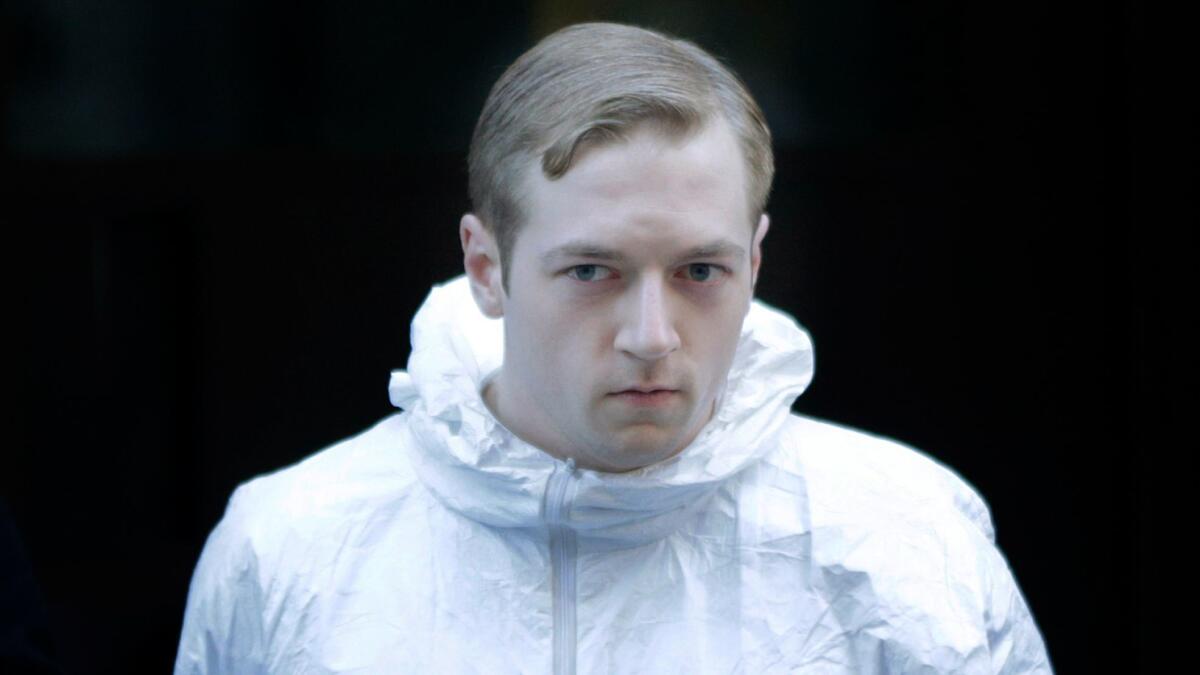Official calls stabbing of black man by white Army veteran an assault on diversity

Officials are calling the death of a black man who they say was repeatedly stabbed with a sword by a white U.S. Army veteran an assault on New York’s inclusiveness and diversity.
James Harris Jackson of Baltimore had taken a bus to New York to target black men, authorities said. He encountered Timothy Caughman, who was collecting bottles from trash cans, and stabbed him in his chest and back with a 26-inch sword, Assistant Chief William Aubry said. Jackson, 28, had been wandering the streets in a long overcoat, which concealed the sword, Aubry said.
He turned himself in at a Times Square police station early Wednesday, a day after the wounded Caughman staggered into a police precinct.
Jackson, who was arrested on suspicion of murder, told police he had harbored feelings of hatred toward black men for at least 10 years, authorities said. He traveled to New York on March 17 and had been staying in a Manhattan hotel.
“The reason he picked New York is because it’s the media capital of the world and he wanted to make a statement,” Aubry said.
Caughman, who was 66 and lived nearby in a transitional house, was taken to a hospital, where he was pronounced dead. According to his Twitter page, he was an autograph collector and a music and movie lover who tweeted about John Lennon, Chuck Berry and the best St. Patrick’s Day writing. He said he wanted to visit California someday.
After the attack, Jackson went to the bathroom of a nearby restaurant and washed off the blood from the killing, authorities said.
Investigators said they believed Jackson was considering other attacks, but surrendered after noticing his photo in media reports. He had two knives and told investigators where they could find the sword, which was later retrieved from a trash can not far from the scene, police said.
Video surveillance captured Jackson in the days leading up to the attack, and investigators said he had walked purposefully toward another black man but did not attack him.
It was not immediately clear if Jackson had a lawyer who could comment on the case. He said nothing to reporters as he was led from a police station. A call to his family’s home phone rang unanswered.
A former neighbor who tangled with Jackson over an apartment in Baltimore recalled him as “a piece of work” who fell months behind on rent.
“He’s just one of those people that you wish you never met,” said Marcus Dagan, who had been informally managing the building on behalf of its then-owner and took Jackson to court over the rent.
Dagan said Jackson moved out in 2015 without paying.
When Jackson moved in in 2014, he indicated he was a military veteran and was in college, studying toward becoming a lawyer, Dagan said. Jackson left behind a collection of war movies, the former neighbor said.
Jackson was in the Army from March 2009 to August 2012 and worked as a military intelligence analyst, the Army said. Deployed in Afghanistan from December 2010 to November 2011, he earned several medals and attained the rank of specialist.
The circumstances of his discharge are unclear; the Army cites privacy laws that prevent releasing such details.
Bias attacks have more than doubled this year in New York, and there have been nine reported bias crimes against black people, up from five in the same time period last year.
“We are a safe city because we are inclusive. We are a nation of unrivaled strength because we are diverse,” Mayor Bill de Blasio said in a statement condemning the attack. “No act of violence can undermine who we are.”
ALSO
Arkansas governor signs bill expanding concealed gun rights
Thirty-five years past a deadline set by Congress, Nevada ratifies the Equal Rights Amendment
Claims of inadvertent U.S. surveillance on Trump transition team raise questions
More to Read
Start your day right
Sign up for Essential California for news, features and recommendations from the L.A. Times and beyond in your inbox six days a week.
You may occasionally receive promotional content from the Los Angeles Times.






